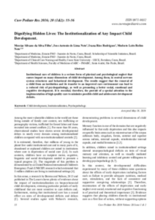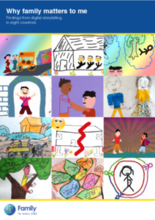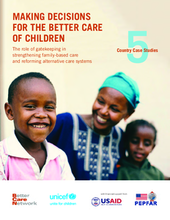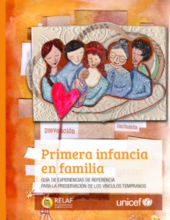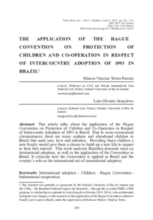Displaying 61 - 70 of 84
This report presents the findings from a study that aimed to explore the application in practice of the ‘necessity principle’ from the Guidelines on Alternative Care for Children (UN, 2009) by using three quantitative and three qualitative indicators that provide information about whether children and families have received support to the fullest extent possible before a child ends up outside of parental care arrangements in formal or informal care, or living alone.
The results of this study suggest that the removal of a child from an institution and its transfer to an improved care environment can lead to a reduced risk of psychopathology, as well as promoting a better social, emotional and cognitive development.
This report examines what family means to children and adults in the following countries: Brazil, India, Guyana, South Africa, Egypt, Mexico, Russia, Kenya. The storytellers use evidence from 59 short films made using digital storytelling technique.
This study examined patterns of prejudice along exclusionary and inclusionary practices involving young men living on the street within the area studied. This longitudinal and ethnographic study stretches over a decade and the same group of boys originally inhabiting one specific neighbourhood (Barra) in their transitions into adulthood. The research included participant observation, narrative interviews with young street dwellers, and semi-structured interviews with middle class residents, businesses, and police officers.
This booklet is based on a recent internal desk review of Save the Children’s and partners’ work against physical and humiliating punishment of children, commissioned by Save the Children Sweden. It aims to present best practices, to show what methods have worked around the world, and to spread knowledge about results achieved and lessons learned when it comes to law reform and positive discipline.
Published jointly with UNICEF, this new BCN Working Paper focuses on the role of gatekeeping in strengthening family-based care and reforming alternative care systems. This Working Paper reviews different approaches to gatekeeping in five countries--Brazil, Bulgaria, Indonesia, Moldova, and Rwanda--to consider what has and has not worked, to analyze lessons learned from practice, and to reflect on the implications for improving policy and programs in this area.
This country care review includes the care-related Concluding Observations adopted by the Committee on the Rights of Persons with Disabilities and the Committee on the Rights of the Child.
Esta Guía reúne una serie de programas, prácticas y políticas públicas que resultaron en la garantía del derecho a la convivencia familiar y comunitaria de niñas y niños en su primera infancia. En particular, se caracterizan por ser innovadoras o por haber obtenido buenos resultados en la protección y la restitución de este derecho. Las experiencias recopiladas abarcan programas, proyectos e iniciativas públicas, privadas o mixtas de fortalecimiento familiar, provisión de cuidados alternativos, y de reintegración familiar.
This article talks about the application of the Hague Convention on Protection of Children and Co-Operation in Respect of Intercountry Adoption of 1993 in Brazil.
This Guide, written in Spanish, features a compilation of several social protection programs, services and public policies that resulted in the prevention of family breakdown and in the support of families and communities in caring and protecting their children. All these examples are taken from the Latin American region, Italy and Romania.


